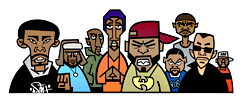Ever since Enter the Wu-Tang (36 Chambers) dropped like an H-bomb in 1993, the RZA, the GZA, the Old Dirty Bizza (R.I.P.), and crew have torn up, conquered, and revolutionized the world of hip-hop. But the influence of these Shaolin-inspired MCs is much more far-reaching. From rock (Band of Horses drummer Creighton Barrett taught himself to play by listening to their records) to film (Jim Jarmusch enlists RZA for many of his works), the Wu have touched the lives of many. But you don’t have to take my word for it: Let a cross-section of Seattle’s musical core tell you, in their own words, why Wu-Tang Clan still ain’t nothing to fuck with.
Barfly, The Saturday Knights
“When I was about 20, I had this roommate named Woody. He paid his rent on time and didn’t mind that I was smoking pot and stealing cable. He was old enough to be my dad. He didn’t own a TV, he read mass-market paperback fiction all day, and he drank Two-Buck Chuck with no brakes. He had this Abyssinian named Abby. I’d walk into the pad drunk, see that cat scamper by, and there Woody would be, peering at me over his reading glasses. “That’s Abby,” he’d say. Every time, like I’d never seen the cat before. Woody was a broke blue blood. A gentleman, though many a night he came home from his Hemingway-wanna-be watering holes touched up with a few battle scars. An argument over sailing that escalated into a fistfight, I imagined. Around this time, Wu-Tang Clan’s first album dropped. I bumped that joint every day. Man, I’d freakin’ crank that album and rap all the words in the mirror, front to back. Woody complained about the noise every time I listened to music loud. Every time except for when I was thumpin’ 36 Chambers. Woody and me didn’t see eye to eye on many things, but I know he loved that Wu-Tang shit.”
Jake One, Producer
“Wu-Tang is one of my favorite rap groups because they went totally against the grain when they came out. RZA was always doin’ unconventional things in his beats, like having loud voices in his samples playing throughout the whole song. Nothing was predictable at all. They brought back the soul to hip-hop and are still keeping it alive to this day.”
Casey Westcott, Fleet Foxes/Crystal Skulls
“I was in sixth grade when 36 Chambers was released. At the time, anything hip-hop was forbidden in my family’s home, as my father didn’t find rap particularly edifying or musical. Consequently, I would sneak out with my friend to listen to music. ‘C.R.E.A.M.’ was my introduction to Wu-Tang and caught me flat-footed. Piano! Arrangements! Drum sounds! I had not heard that kind of detail and craftsmanship before. To learn to play the keys, I transcribed their records, including solo albums. I recall playing the Charmels piano sample from ‘C.R.E.A.M.’ and the voicings from ‘Love Jones’ (Bobby Digital) in my family’s living room, when my father interrupted midsong and said, ‘That music is real pretty, son. Where did you learn that?'”
DV One, Rock Steady Crew/Seattle Legends
“Wu-Tang was to the ’90s what N.W.A. was to the ’80s. Similarly, Wu-Tang is to the East Coast was what N.W.A. was to the West. A supergroup with a plethora of talent, from MCs to producers, rappers to songwriters. Witty, unpredictable talent and natural game. As a DJ, Wu-Tang made it easy to be a selectah from ’93 to about ’97. Enter the Wu-Tang, Liquid Swords, Cuban Link, Method Man’s Tical…even Sunz of Man and Gravediggaz gave me heat for my decks. Into the 2000s, we got to see Ghostface bloom and keep the Wu-Tang rep strong. Wu-Tang was always OK with me because they repped hard! You always knew you would get some grimy, raw East Coast raps. I was also feelin’ them cats because they were crew. A strong crew, with powerful members. R.I.P. Ol’ DB!!”
Kerri Harrop, aka DJ Cherry Canoe
“In the early ’90s, Sub Pop inked a tremendous deal with the Warner Music Group, selling off 49 percent of the label in exchange for millions of dollars. It was an exciting and weird time to work at Sub Pop—the Warner dough allowed for all sorts of experimentation and expansion. As time has proven, not all of it was good. To combat the inevitable division between staffers separated by three bloated floors of office space, we would have show and tell on Friday afternoons. We would drink beer and share records, art, gossip, and news with each other. It was fun. The soundtrack was always heavy on the indie rock, which is why the day I brought in Wu-Tang Forever really stands out in my dusty memory. Watching Jonathan Poneman favorably respond to ‘As High As Wu-Tang Get’ helped me forgive him for making us sell crap like the Blue Rags.”
Vitamin D
“Wu is hip-hop in its raw form. In the ’90s, they put the basement in our living room. They put the block in major clothing stores and corporate boardrooms. Their music reflected the black struggle and provided the hood with answers to some of those struggles. They made the ultimate contribution to hip-hop by creating their own sound and changing how we thought of rap, innovating slang that we still use today. That’s hip-hop in its complete essence.”
FourColor Zack, DJ
“The Wu captured my attention with their refreshing take on reality. The way they structured their music, ideas, and personalities was so different from what I was used to being subjected to. What they were spitting was unfiltered and removed from other East Coast groups at the time. They simply translated their thoughts to music in a very unique way, which was not being replicated from anyone else. It’s almost like the ground cracked open, and they shot up from the center of the Earth with this insane thought process and narrative style. With such a large family dynamic, they had the ability to house a [varied] cast of characters and styles. If I ever got a little burned out on one member, there was always another to lean on and get more hyped on. When they started pumping out the first few solo records, it became even clearer how effective that technique was. They could bug out in any direction they wanted, and the listener would had full faith in where they were taking you. Wu-Tang channeled so much mysterious energy that, just by listening, you felt like you were studying some Tibetan manuscripts. They were bringing you some seriously rugged sounds and were talking about street life and somehow were also sneaking in a kung fu film at the same time. Dudes were bananas.”
Jonathan Moore, Music Manager/Cultural Ambassador
“Wu-Tang is artistic and entrepreneurial innovation in its rawest and most clever form. They brought a new way of thinking, speaking, and colorful style to the game. In the immortal words of the great American poet Russell Jones, aka Baby Jesus, aka Ol’ Dirty Bastard: ‘Wu-Tang is for the children, Wu-Tang loves the kids.’…Rest in peace, ODB….Wu-Tang forever….’Kick the Truth to the Young Black Youth.'”
Scott Reitherman, Throw Me the Statue
“Sophomore year of high school, I’m captain of the J.V. boys basketball team and get to make the warm-up tape for our pregame routine. Turn it on over the gym P.A., run out of the locker room, do lay-up lines, make sure your jersey looks untucked enough, etc. ‘Wu-Tang Clan Ain’t Nuthing to Fuck Wit’ was the first track on the tape. Ihad dubbed iton my parents’ stereo and sat there in the living room practicing how to make my radio edit in real time. The hook would start, I’d ready my hand on the volume fader, and when their chorused growl would hit ‘Ain’t Nuthin Ta…,’ I’d drop it down and pop it up so that you’d still hear the ‘Wit.’ It was the only way we could get our Tiger Style beats past the coach, and the littleprofanity wipeIdid on the tape actually played out believably. Urban grit with the safety on. Wu helps white folks ball—maybe that’s the moral.”






